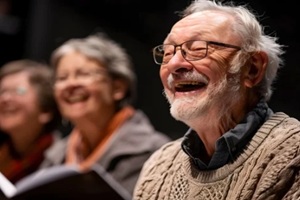 As people age, their friend groups tend to thin; from others passing away to mobility challenges making sustained friendships difficult, it is common for older folks to maintain a smaller social circle. However, this tendency toward isolation can lead to problematic outcomes, including senior loneliness and even health issues.
As people age, their friend groups tend to thin; from others passing away to mobility challenges making sustained friendships difficult, it is common for older folks to maintain a smaller social circle. However, this tendency toward isolation can lead to problematic outcomes, including senior loneliness and even health issues.
For aging adults who feel alone or no longer have a strong circle of friends, it is important to continue to pursue other alternatives for socialization. Thanks to the internet, many options are available; however, there is also great value in being able to interact with others in person in the local community. This is where the power of storytelling circles can be felt most prominently.
In order to find storytelling groups and other opportunities in your community, it is helpful to understand what sorts of activities these groups participate in.
The Senior Loneliness Epidemic and What It Means
Is loneliness truly a catastrophic consequence of getting older? Research repeatedly indicates that aging adults who are alone frequently can develop health conditions more rapidly or with greater severity, including Alzheimer’s and even heart disease. In a world where as many as one-third of adults describe themselves as “lonely,” and an additional third of those over the age of 65 qualify for the criteria of full social isolation, the health effects on the population can be staggering.
Loneliness is not simply an unfortunate consequence of aging. While it is more common in older individuals, it should not be accepted as part of the next stage of life, and families should strive to provide as much social opportunity for their loved ones as possible.
Doing so not only boosts mental health but also decreases all-cause mortality. While older adults who are lonely see an increased risk of death from any cause (32% higher) and from cancer specifically (14% higher), those who maintain close social bonds do not face the same odds.
How Storytelling Helps Senior Loneliness
If socialization is so important for older adults, then why focus on storytelling specifically? While it is true that social activities should be chosen with each specific individual’s interests in mind, there are some unique benefits that come with storytelling circles.
Emotional regulation
Older adults who tackled life’s challenges without a strong sense of support or mental health help may now be paying the price in their later years. Storytelling can serve as a powerful means of achieving emotional catharsis, whether through reminiscing about their life’s many positives or finally having the time to process their traumas and find closure with the help of others.
Uplifting personhood
As a person ages, it becomes easier to focus on the negatives: a body that is no longer capable of things it could do with ease in the past, a forgetful memory, and more. Storytelling allows seniors to recount the times in their lives when they accomplished profound things, overcame the odds, or participated in something life-changing. This, in turn, helps to remind them of their own value and provide a positive mindset for the future.
Memory
Storytelling is good for the soul, but it is also valuable for the mind. Recalling stories stimulates the brain, keeping old neural pathways active. Engaging in this type of activity on a regular basis can be protective against the fast decline associated with Alzheimer’s and dementia. While it cannot prevent these conditions, it can prolong the earliest stages so that your loved ones continue to enjoy their memory recall.
Storytelling Circles in Communities
 Storytelling circles are great for individuals, but they are also significant for communities. The older generation is full of experience, knowledge, and memory of events or places that may not be the same (or may no longer exist at all).
Storytelling circles are great for individuals, but they are also significant for communities. The older generation is full of experience, knowledge, and memory of events or places that may not be the same (or may no longer exist at all).
Storytelling allows people to share knowledge before it is lost to time. Whether that is a storied family recipe, a particular perspective on a famous event, or simply insight into what life was like in a time before now, their contributions to the fabric of the community’s history cannot be replaced.
Find Groups to Share Stories in Your Area
Loneliness becomes more common as a person gets older, but it is not something that should simply be accepted as part of the aging process. In fact, loneliness can cause significant mental and physical harm. Families are encouraged to embrace the power of storytelling in their communities.
Contact us to discover how the Shepherd’s Center of Northern Virginia is making a difference in communities like Oakton, Vienna, Dunn Loring-Merrifield, Great Falls, Herndon, and Reston. If you’re outside these areas but have questions, give us a call, and we’ll guide you to the Shepherd’s Center nearest to you!
